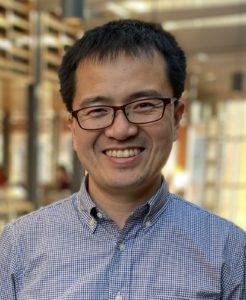Read Junpeng’s Emerging Investigator article, Bulk depolymerization of graft polymers based on trans-cyclobutane-fused cyclooctene, DOI D3PY00812F.
Check out our interview with Junpeng below:
How do you feel about Polymer Chemistry as a place to publish research on this topic?
Polymer Chemistry is a journal that publishes solid work on innovative polymer chemistry research, and I am very pleased that our discovery on the bulk depolymerization of graft polymers can be published in Polymer Chemistry.
What aspect of your work are you most excited about at the moment and what do you find most challenging about your research?
I am actively working on solutions for sustainable polymers, and I am most excited that by applying principles in physical organic chemistry, we can bring new insights into the design of sustainable polymers. Sustainable polymers need to be competitive in properties and cost in order to replace current polymers. While my training allows me to study structure-property relationships to optimize material properties, I find it challenging to also take into account the cost and scalability. This is a grand challenge for the entire field of sustainable polymers, and I enjoy tackling the challenges.
In your opinion, what are the most important questions to be asked/answered in this field of research?
How can we design polymers that show material properties comparable to current ones while having the potential for industrial production?
Can you share one piece of career-related advice or wisdom with other early career scientists?
There are many tasks for an us early career scientist, and some of them might not be so enjoyable. We need to make sure that we spend time on the things you are most excited about everyday so that we stay motivated.
Keep up with Junpeng’s research by checking out his website or following him on X @JPChem1.











